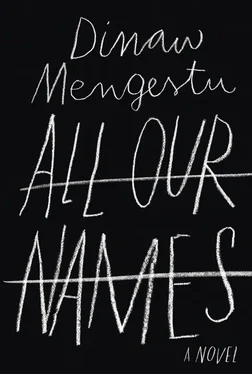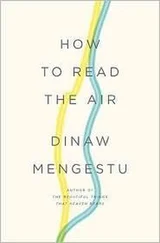“We don’t have to hide,” he said. “He knows about us already.”
I’m sure I protested about the dinner initially, but not hard enough. I doubt I ever said no directly: I did sense the danger of letting someone like Henry into our life, but I was too curious, too desperate to know who Henry was and what he knew, to refuse the opportunity to meet him.
Isaac scheduled the dinner for six o’clock on a Friday. I arrived at five-thirty, and Henry was already there. My first impression when he opened the door was that he looked as if he had gotten fatter in the months since I had last seen him, but I knew I had no honest image of him. I wanted a brutish, crass man; what I got instead was a charmer — a man who took my jacket when I entered the apartment and hung it in the closet as if he were the host, which, for all intents and purposes, he was. We were in Isaac’s apartment, but Henry brought everything to the dinner: the wineglasses on the table, the silver forks and knives, and the real cloth napkins that, in my mother’s house, no occasion was special enough for. The chicken in the oven, he admitted, had been cooked by his wife that afternoon. “All I had to do,” he said, “was throw it in the oven and keep it warm.”
I came to dinner prepared to extract some vital kernel of fact about Isaac, but I was the one who spent the bulk of the dinner revealing myself. Henry asked me about my job, its joys and pitfalls. Those were his exact words. “Isaac tells me you’re a social worker,” he said. “I’m sure people ask you all the time to tell them about the joys and pitfalls that come with a job like that.”
I was rarely asked to describe my job. David had told me never to tell any man I wanted to date what I did for a living. “Say you’re a teacher, or a secretary. Men are afraid of women who seem better than them.”
Henry had spoken with a wide-eyed earnest stare that gave the impression that whatever I had to say was of the utmost importance and the only way I could disappoint him was if I failed to say more. He was flattering me. I knew that, but after a while I didn’t care.
“You really want to know?” I asked him.
“I do,” he said. “Maybe in my own way I once tried to do the same.”
“That’s why you worked in Africa?”
“No. That’s why I stayed long after I should have left.”
We carried on like that for more than an hour, just the two of us, as if Isaac weren’t even there. The more I talked, the more intently Henry listened, so that by the end I found myself seeking his approval. When I said, “What we need in our town is more people like Isaac,” it was to Henry and not Isaac I was speaking.
Henry told me snippets about his career in Africa, enough to make me feel that he had also shared some part of himself. When I asked what it was like being a diplomat, he gave me one of those seemingly sincere, deep-hearted laughs that are supposed to imply humility.
“ ‘Diplomat’ sounds much more exciting. To be honest, I was an old-fashioned government bureaucrat. I started off stamping visas in Tanzania. I hated it. Not the job, but the country. I used to say staying out of Africa was the smartest thing America ever did. I went there because I thought it would be the easiest way to get to Europe someday, but then independence came, and suddenly Africa seemed like the most interesting place to be. The French and British and Belgians were running out as fast as they could, and we became the biggest players in town. When I was moved to Kenya, I could pick up the phone and get the president on the line. I sat in hotels and gave lectures on democracy and our constitution. After a while, I didn’t want to leave. When I’d come back to D.C., I’d tell my bosses that we could do more than just try to keep the Russians out. I thought we could get the whole continent on our side, if only we had the right leaders. That’s when I was moved to London. When I asked my boss why, he told me I’d lost sight of our larger objective. No one in Kansas cares about what happens in Africa, he told me. I’d gotten carried away, which was a diplomatic way of saying I’d gone native.
“I met some of the most interesting people from the continent in London, though, including our mutual acquaintance Joseph. I suppose we should be thanking him for getting our friend Isaac here. He was the most remarkable person I met in London, and probably the only real friend I had.
“They wouldn’t let coloreds into the club where all the diplomats drank, so we used to drink at the pub across the street. I had met his father in Kenya. He told me his son was studying in London, so I promised to buy him lunch if he looked me up. Of course he did. Africans always do. They love anyone who they think has power. I liked Joseph as soon as we met. On the outside, he was formal like an Englishman, but he disliked them as much as I did.
“We drank at that bar two, three times a week for almost two years. A bit more often after his father died. At least once a week, Joseph would say, ‘Henry, do you think if I were president they would let me into your club?’ He didn’t care about the club. It was the lies that it was built on that made him angry. ‘They kill us and say it’s adventure. If I raise my voice to a white man in London, someone will look at me as if I were an animal.’
“From time to time, at the end of the night he would cross the street and demand to be let into the club. I heard him say to the doorman, ‘You should put bars on the windows. Everyone inside is a criminal.’
“I thought he would be president of his country someday. But Isaac can tell you better than I can how wrong I was.”
Henry said more than he had expected. He began to grow cold, distant, as he retreated into other memories. I asked the only question I could think of:
“Did you like London?”
“No,” he said. “I hated it. I was at a dinner one evening when someone asked me what I thought about taking back the colonies. I knew who he was — the minister of something or other — but I couldn’t help myself. I said only little people on a little island would talk like that. He pretended to laugh. He said, ‘Only an American would use the word “little” twice as an adjective in the same sentence.’ I said, ‘You’re right. How about “Only tiny, ignorant people on a miserable little island would talk like that”?’ I thought he was going to hit me. But you know what he said? ‘This is the best dinner conversation I’ve ever had with an American.’ We spent the rest of the night insulting each other. I was told the next day to stay clear of any official events. Six months later, I was reassigned to a consulate office in Canada. That’s when I decided to quit.”
When dinner was over and Isaac was in the kitchen, clearing the plates, Henry leaned over his side of the table and motioned for me to do the same. “Thank you for coming to dinner tonight,” he said. “Isaac is lucky to have met you. I was worried about what would happen to him here. He’s adjusted well. I think, wherever he goes next, he’ll be fine.”
“And where is he going?” I asked him.
He turned to see if Isaac was looking at us.
“I helped get him here,” he said. “What he does next is up to him. After what he’s gone through, I doubt he’ll ever go back. I’m not even sure where ‘back’ would be for him. You probably know more than I do.”
I tried to play along. I didn’t know more, but I was afraid Henry would think less of me if I said that, so I smiled and leaned back in my chair as if I were trying to keep a secret close to my chest.
By the time Isaac returned to the table, I felt slightly lightheaded. All the holes that I had allowed to exist between us were finally catching up with me. Isaac offered us coffee and dessert; I tapped the floor hard with both feet just to feel something solid beneath me, while Henry graciously declined both.
Читать дальше












